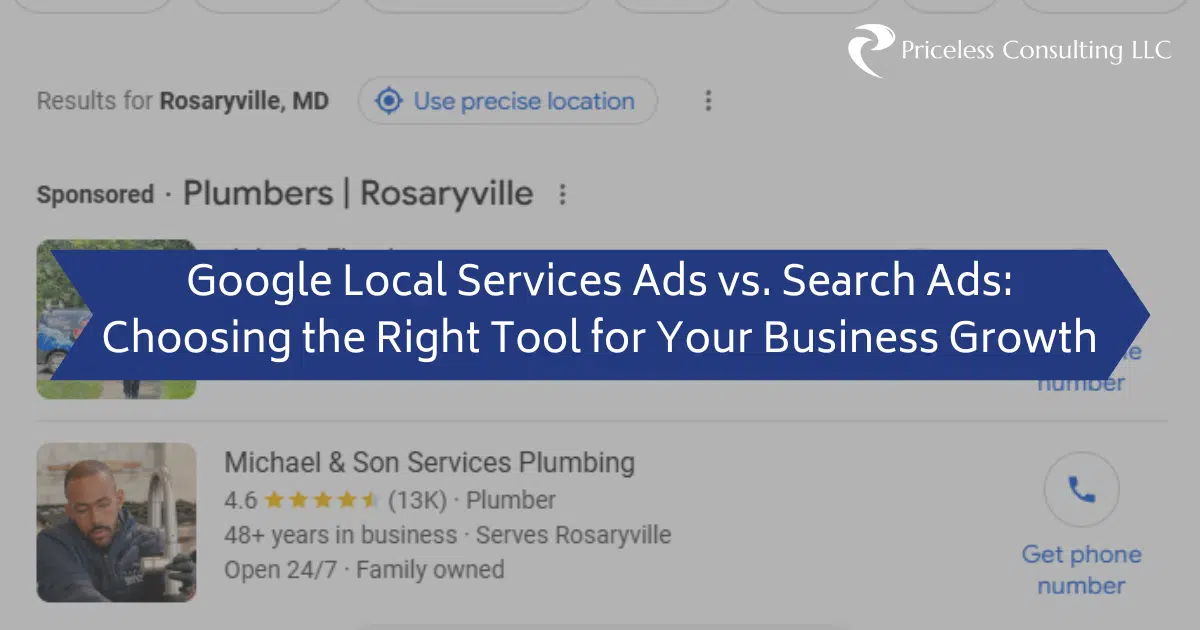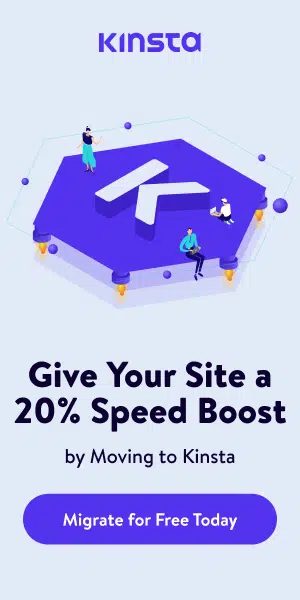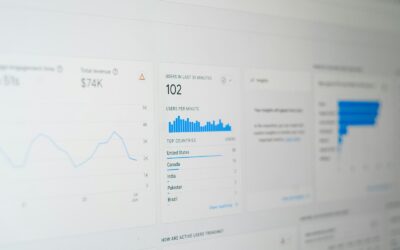Let’s dig into how each ad type functions and when you should consider using one over the other (or even both!).
Understanding the Basics: What Are LSAs and Search Ads?
Local Services Ads
Google’s Local Services Ads (LSAs) are designed specifically for service-based businesses looking to connect with local customers. Think of LSAs as a quick way for customers to find trusted service providers nearby. If you're in industries like plumbing, pet grooming, landscaping, or HVAC, LSAs were practically made for you!
Search Ads
On the other hand, Search Ads are those keyword-targeted ads you see just below LSAs and above organic search results on Google. These ads are versatile and customizable, allowing businesses to target specific keywords, audiences, and even demographics. They work for nearly any industry and can support a range of goals, from brand awareness to website traffic and direct sales.
The Cost Breakdown: Pay-Per-Lead vs. Pay-Per-Click
Local Services Ads – Pay-Per-Lead
LSAs use a pay-per-lead model, which means you only pay when someone contacts you directly from the ad. For service-based businesses, this can be a game-changer because it keeps the focus (and budget) on generating actual leads. You’re not paying for clicks that may or may not convert; you’re paying only when a customer reaches out for service.
Search Ads – Pay-Per-Click
With Search Ads, you pay-per-click (PPC), so you’re billed each time someone clicks on your ad, regardless of whether they turn into a lead or a sale. PPC is great for driving traffic to your website and works well when combined with strong landing pages and conversion-optimized content. It does, however, require careful monitoring and budget management to ensure your investment pays off.
Example
Imagine you're a local locksmith. With LSAs, you’d pay only when a customer calls you for service. With Search Ads, you’d pay whenever someone clicks through to your website—even if they were just looking for general information.
Looking for an experienced Wordpress Development company?
Placement and Visibility: Top of the Page, Where It Matters
LSAs Get Prime Placement
LSAs appear at the top of Google’s search results, even above the regular paid ads. This prime spot means LSAs catch users’ attention first, which is ideal for service-based businesses looking to stand out.
Search Ads Are Versatile but Not Always at the Very Top
Search Ads are still highly visible, appearing just below LSAs but above organic search results. They also have a wider reach, showing up across Google’s Display Network and YouTube, giving you options to target users who aren’t actively searching but might be interested in your services or products.
Example
If someone searches “emergency plumber near me,” an LSA for a plumbing business will likely appear right at the top, while Search Ads would be positioned just below. This slight difference in visibility can be significant, especially for urgent services where customers want quick results.
Targeting Options: Reaching the Right Audience
Local Services Ads – Location Focused
LSAs focus on location-based targeting. They’re specifically designed to help service businesses reach nearby customers, making them perfect for local businesses with a service area radius. Customers are more likely to find your business when they’re nearby and actively searching for the services you provide.
Search Ads – Flexible, Keyword and Demographic Targeting
With Search Ads, you have extensive targeting options, from selecting keywords and audiences to narrowing down by demographics and interests. If your business has both local and broader goals, Search Ads can help you reach users searching for specific terms, like “eco-friendly cleaning products” or “virtual marketing consultations,” across a wider geographic area.
Example
A local pet groomer might stick with LSAs to ensure they’re reaching nearby customers actively seeking grooming services, while an eCommerce brand with eco-friendly pet products could use Search Ads to attract environmentally-conscious shoppers nationwide.
Building Trust: The Google Guaranteed Badge
LSAs Build Customer Confidence with Google Guarantee
LSAs have a big advantage in the form of the Google Guaranteed badge. This badge shows that Google has verified your business, making customers more confident in reaching out. It’s a powerful trust factor, especially for industries where customer confidence is crucial (think locksmiths, electricians, or movers).
Search Ads Offer Credibility Through Ad Extensions
Search Ads don’t have a badge but do offer a range of ad extensions. These extensions let you add extra details like contact numbers, links to different web pages, or even customer reviews. Ad extensions not only add credibility but also help increase the ad’s real estate, making it more noticeable.
Example
Imagine you’re a local HVAC provider. Having the Google Guaranteed badge on your LSA could make all the difference for a customer in a hurry to find someone trustworthy. Meanwhile, a Search Ad could use extensions to link to service pages, seasonal promotions, and reviews, giving customers a fuller view of your offerings.
Ease of Use: Setting Up and Managing Ads
LSAs – Low Maintenance, Quick Setup
LSAs require minimal setup, as you don’t need to write ad copy or do keyword research. You’ll need to provide details about your services, location, and operating hours, and Google takes it from there. While this is convenient, it also means there’s less flexibility for businesses wanting more control over their messaging.
Search Ads – More Control but Requires Active Management
Search Ads give you the flexibility to create your own ad copy, choose keywords, and adjust bidding, providing full control over your campaigns. This flexibility is excellent for businesses with dedicated marketing resources or those wanting to actively manage their campaigns to optimize performance.
Example
A local cleaning service may opt for LSAs to get up and running quickly without worrying about ad copy. Meanwhile, an agency might use Search Ads to carefully target keywords like “best digital marketing firm” or “SEO for small businesses” to reach a broad but specific audience.
Which One Should You Choose?
- Go with LSAs if: You’re a local, service-based business (like a plumber, pet groomer, or landscaper) that wants quick, direct connections with nearby customers. LSAs are also ideal if you want a low-maintenance advertising option that’s straightforward and cost-effective.
- Go with Search Ads if: Your business benefits from a wider reach, like an eCommerce store or a brand looking to target specific keywords and audiences. Search Ads allow for more customization and control, making them suitable for businesses with dedicated marketing resources or a focus on expanding their reach.
Or Use Both to Get the Best of Both Worlds
In some cases, combining LSAs and Search Ads can yield the best results. This strategy allows you to get in front of local customers with LSAs while using Search Ads to capture a broader audience based on specific keywords.
Example
If you run an HVAC company, LSAs can help you reach customers nearby looking for immediate service, while Search Ads targeting “eco-friendly HVAC systems” could attract a broader audience interested in learning about energy-efficient options.
Final Thoughts
Google’s LSAs and Search Ads each have their strengths, and the right choice depends on your business goals. Are you looking to drive local leads? LSAs could be your best option. Want to reach a larger audience with specific keywords? Search Ads might be the better fit. Or consider using both to cover your bases and maximize your reach!
In the end, the key is to align your ad strategy with your business objectives and budget. Whether you’re looking for immediate, local leads or want to attract a nationwide audience, Google has an option that fits. Start small, test both ad types if possible, and keep optimizing to make sure your investment pays off.







